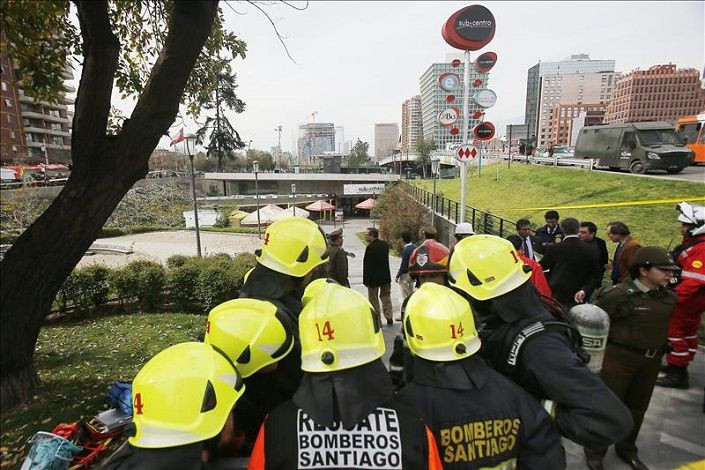
Santiago de Chile, Sep 9 (EFE).- Chile has been deeply shaken by the worst attack in 30 years when a bomb exploded in a shopping gallery in a metro station in the capital which left 14 injured with two in critical condition.
Minutes after the blast that occurred during lunch hour Monday at the Escuela Militar metro station used by 150,000 people daily, the Chilean government called it a terrorist attack and announced that it would fully apply the special laws covering such crimes.
"It is a terrorist act, without doubt, and deserves our condemnation. The government will call for the anti-terrorist law to punish all those guilty and who will receive the maximum power of the law," government spokesperson Alvaro Elizalde said.
The injured were rushed to Santiago hospitals where they received emergency medical attention. Some of the victims required surgery, authorities said.
President Michelle Bachelet, who suspended all scheduled activities and held an emergency security meeting in the La Moneda presidential palace, visited three of the wounded in the hospital.
"This is one of the most cowardly acts we have seen because it was aimed at harming people (and) generating terror, including the death of innocents," the president said following the hospital visit.
"What has happened is horrible, an abominable act, but Chile is, and will continue to be. a safe country," Bachelet said.
Attending the security meeting were senior police commanders, national prosecutor Sabas Chauan, Justice Minister Justice Jose Antonio Gomez and Interior Minister Rodrigo Peñailillo.
Peñailillo said that the government had taken measures to identify and detain those responsible for the bombing, demanding quick results from police and prosecutors.
Senior police and domestic intelligence officials received orders to carry out a thorough investigation of the attack.
"It was a clear and precise instruction from the government," said Peñailillo.
So far this year, Santiago has been the scene of around 30 bomb explosions near police stations, public buildings and bank branches.
Although in some cases the perpetrators have been delinquents attempting to rob ATM machines, in other cases anti-establishment groups claimed responsibilty.
However, the government has yet to arrest a single suspect in the attacks.
Bachelet said that in spite of Monday's attack and two other recent bombing which did not cause casualties -one in the Los Dominicos metro station and the other near a police station - "it cannot be said that there is terrorism in Chile".
The president said that by the end of this month she will send to parliament a bill that would guarantee the effectiveness of current anti-terrorist law.
Following Bachelet's announcement, several rightist opposition groups accused the government of what the called a lukewarm response in dealing with the violence.
"How long do we have to wait to have peace in the country?" asked the president of National Renewal Party, Christian Monckeberg, charging that Monday's attack "could have been avoided".
Former interior minister Andres Chadwick said "this is a moment for unity against terrorism" while claiming that the government had been weak in its response to the bombings.
Independent Democratic Union leader Ernesto Silva called on the government to take responsibility for the situation.
The criticisms triggered a strong reaction from the interior minister who accused the opposition of seeking political capital from the crisis.
"The people who minutes after an attack like this take political advantage is something unacceptable and must be rejected by the entire country," Peñailillo said.
The worst terrorist attack on the capital's underground transport system took place at the end of the military regime in 1986 when a bomb exploded in the Tobalaba station, killing and one person and injuring seven others.
The Costa Rican foreign minister expressed his "deepest condolences" to the people of Chile, while the secretary of the Mexican Foreign Ministry expressed his condemnation of the terror attack.
Secretary-General of the Organization of American States Jose Miguel Insulza also condemned the attack and said he supported the Chilean authorities intention to strictly apply the anti-terrorist law. EFE
© 2025 Latin Times. All rights reserved. Do not reproduce without permission.




